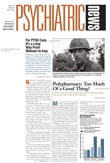A valuable addition to the DSM-IV-TR series has just been published by American Psychiatric Press Inc. (APPI). The Treatment Companion to the DSM-IV-TR Casebook focuses on treating the wide range of psychiatric disorders described in the DSM-IV-TR Casebook.
The new book describes 34 case illustrations of psychiatric disorders (31 of them taken from the DSM-IV-TR Casebook), and for each of them experts discuss how they would treat the patient described in the highlighted case.
In the treatment companion volume, which was edited by Robert L. Spitzer, M.D., Michael B. First, M.D., Miriam Gibbon, M.S.W., and Janet B.W. Williams, D.S.W., the expert presents a discussion of how he or she would go about treating the patient and outlines general principles to be considered when treating a patient with the disorder or disorders at issue.
The cases cover a range of psychiatric disorders from the more commonly seen—ADHD, schizophrenia, obsessive-compulsive disorder, and major depressive disorder, for example—to the less frequently encountered, such as Asperger’s disorder, gender-identity disorder, schizophreniform disorder, anorexia nervosa, and sexual sadism. The case descriptions also feature discussions of substance use disorders, such as alcohol dependence and cocaine dependence, and several anxiety disorders, including posttraumatic stress disorder, separation anxiety disorder, social phobia, generalized anxiety disorder, and panic disorder.
The treatments discussed also describe the gamut of options psychiatrists have at their disposal. Pharmacotherapies are presented in some of the case examples, while others focus on the use of cognitive-behavioral therapy, interpersonal psychotherapy, supportive psychotherapy, family-focused therapy, couples therapy, behavior exposure, or relaxation exercises, among others.
Spitzer, who chaired the APA group that developed DSM-III in 1974 and its 1980 revision and is chief of Biometrics Research at Columbia University, commented to Psychiatric News, “If as a clinican you want to know how some of the most famous psychiatrists approach the treatment of the most important mental disorders,” then the treatment companion volume is “a must-read.”
He added that like the DSM-IV-TR Casebook, the commentaries are “lively, sometimes controversial, and fun to read.” That is certainly borne out by the chapter titles among which are “Goody Two Shoes,” “Lady Macbeth,” “Late Bloomer,” “My Fan Club,” and “Elephant Man.”
Ordering information for the treatment companion volume and other APPI publications is available by phone at (800) 368-5777; e-mail at [email protected]; or online at www.appi.org. ▪
